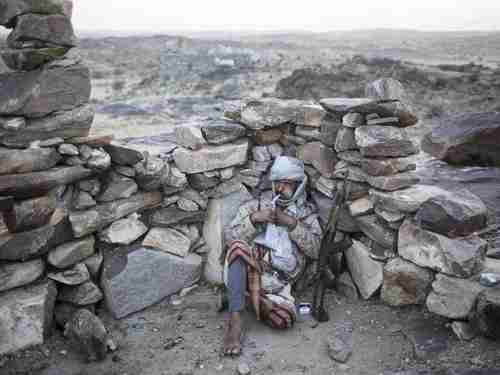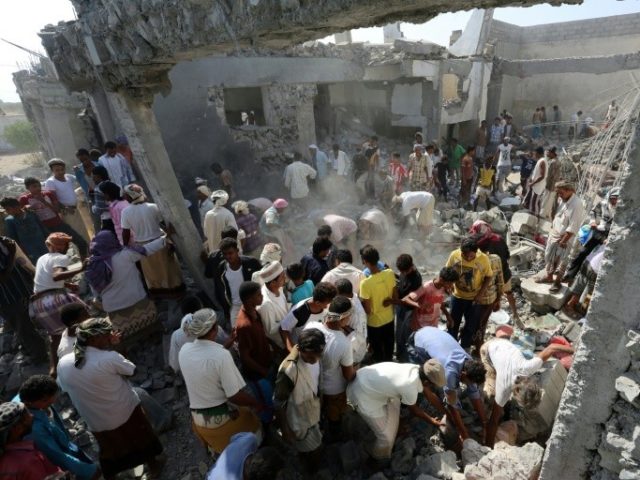This morning’s key headlines from GenerationalDynamics.com
- Saudi coalition claims to have captured airport in Yemen’s Hodeidah
- United Nations renews its peace plan proposal
Saudi coalition claims to have captured airport in Yemen’s Hodeidah

Tribal Yemeni fighter in town of al-Bayda on May 9 (The National)
The news agencies of the United Arab Emirates (UAE) are reporting that troops from the Saudi-led military coalition have taken control of a large part of the airport in Yemen’s port city of Hodeidah on Tuesday, recapturing it from Iran-backed Houthi rebels that have controlled the port since 2015.
This comes a week after the coalition began large-scale ground operations against the port city, supported by air and naval forces, as we described in “15-Jun-18 World View — Saudi Arabia and UAE launch a ‘catastrophic’ assault on Port Hodeidah in Yemen.”
However, the road that leads from the airport to Hodeidah’s city center is heavily populated, and there is still heavy ground fighting going on with the Houthis, with the coalition fighters supported by close air support from Apache helicopter gunships.
Capturing the airport is an important first step for the coalition in recapturing the port city, but a lot more is necessary. Hodeidah is densely populated with around 600,000 people, and the Houthis are well entrenched within the population. It is feared that the urban house-to-house fighting will go on for months, just as we have already seen in the fights by Iraqi forces against ISIS in Mosul or the Kurdish YPG forces against ISIS in Raqqa in Syria. Similar urban fighting in Hodeidah could cost the lives of as many as 250,000 people, according to UN estimates.
It is not expected that the Saudi coalition will use the same tactics that Bashar al-Assad used in ejecting opposition rebels from Aleppo and Ghouta in Syria. Al-Assad used barrel bombs laced with chlorine gas specifically targeting women and children, and also used Sarin gas to kill large numbers of civilians. Even with the use of chemical weapons, those battles took several months. The National (UAE) and Reuters
United Nations renews its peace plan proposal
The fear of casualties resulting from the Saudi coalition assault on Hodeidah goes far beyond the possible casualties in the port city itself. NGOs use the port to import badly needed humanitarian aid, including food, water, and medicines, for 8 million Yemenis, out of a total population of 22 million. Many Yemenis are already on the verge of starvation and the closure of the port for even a few days could be disastrous.
Somewhat miraculously, the port remained open on Tuesday, and the UN World Food Program was able to unload three ships containing enough food for six million people for one month.
Under Houthi control, NGOs had been able to bring humanitarian supplies through Hodeidah port. However, the Houthis charged NGOs steep license fees to dock their ships, so the port has been a major source of income for the Houthis. Furthermore, the port has been a lifeline for the Houthis war supplies including, allegedly, weapons systems provided by Iran.
For those reasons, losing control of the port would be a major setback for the Houthis, and have a significant negative impact on their war effort.
In the last few weeks, the United Nations had proposed a peace plan where UN peacekeeping forces would take control of the port so that the fighting between the Saudi coalition and the Houthis could stop. However, the Houthis rejected that peace proposal, since control of the port is essential to their war effort.
The Saudi coalition is now demanding that the Houthis must withdraw completely from Hodeidah and hand over control to the UN.
UN special envoy for Yemen Martin Griffiths, who has been in Yemen’s capital city Sanaa negotiating with the Houthis, hopes to restart talks on a peace plan next month. Assuming that the Saudi coalition has control of the vital parts of Hodeidah, the hope is that the Houthis will yield control of the urban areas, rather than remain entrenched with a resulting bloodbath in urban fighting. Al-Jazeera and The National (UAE) and AFP
Related Articles:
- Saudi Arabia and UAE launch a ‘catastrophic’ assault on Port Hodeidah in Yemen (15-Jun-2018)
- Saudi Arabia sacks its top tier of military commanders as Yemen war drags on (27-Feb-2018)
- Iranian advisors are ‘on the ground’ with Houthis in Yemen, supplying weapons and intelligence (06-Jan-2018)
- UAE backs out of Saudi coalition in Yemen, saying ‘War is over’ (17-Jun-2016)
- Brief generational history of South Yemen (29-Jan-2018)
KEYS: Generational Dynamics, Yemen, Houthis, Iran, Saudi Arabia, United Arab Emirates, UAE, Hodeidah, Syria, Bashar al-Assad, Aleppo, Ghouta, Raqqa, Iraq, Mosul, Martin Griffiths, Sanaa
Permanent web link to this article
Receive daily World View columns by e-mail

COMMENTS
Please let us know if you're having issues with commenting.